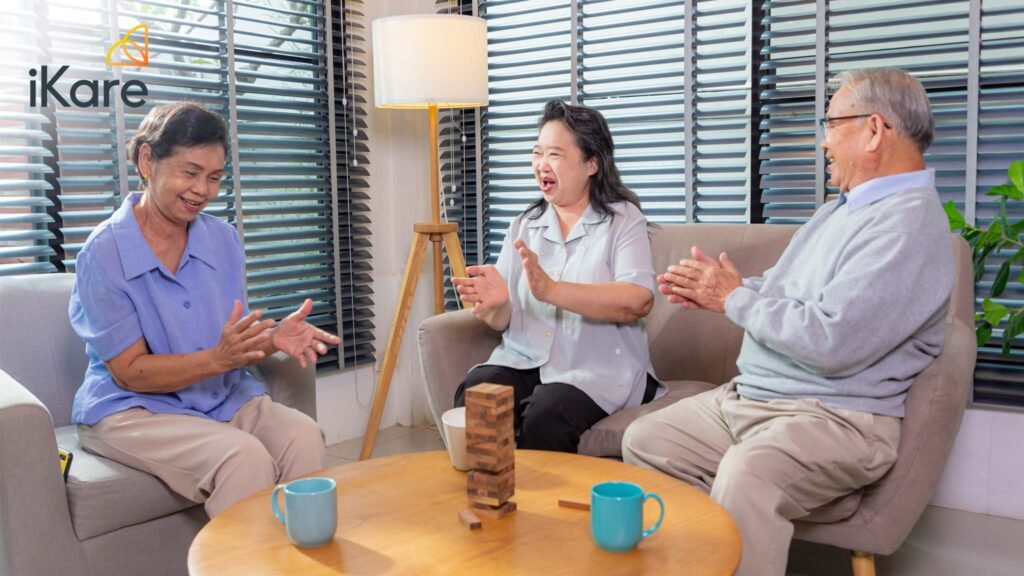
Tips for Effective Communication with Dementia Patients
Dementia is a progressive disease that can significantly impact a person’s communication skill. As of 2023, approximately one in 11 people aged 60 and above in Singapore has dementia.
Dementia affects memory, thinking, and behaviour, can significantly impact a person’s communication skills. This is because dementia damages areas of the brain responsible for language, comprehension, and social interaction.
Ways in which dementia can affect communication:
- Difficulty finding words: People with dementia may struggle to find the right words to express themselves. This can lead to frustration and misunderstandings.
- Reduced comprehension: Dementia can impair a person’s ability to understand what others are saying. This can make it difficult to follow conversations and respond appropriately.
- Changes in speech patterns: People with dementia may experience changes in their speech patterns, such as speaking slowly, repeating words, or using incorrect words.
- Difficulty following social cues: Dementia can affect a person’s ability to understand and respond to social cues, such as facial expressions, body language, and tone of voice. This can lead to misunderstandings and social isolation.
- Memory loss: As dementia progresses, memory loss can make it difficult for people to remember names, places, or recent events. This can make it challenging to engage in meaningful conversations.
- Changes in personality: Dementia can cause changes in personality, leading to mood swings, anxiety, or agitation. These changes can affect a person’s communication style and make it difficult to interact with others.

As a caregiver, understanding and adapting your communication strategies can greatly enhance your interactions with a loved one living with dementia. Here are some tips to help you communicate effectively:
- Simplify Language and Avoid Jargon:
- Keep it simple: Use clear and concise language, avoiding complex terms or phrases.
- Avoid jargon: Medical terms can be confusing for individuals with dementia. Use everyday language instead.
- Use Visual Cues:
- Pictures and objects: Show photos or use familiar objects to aid understanding.
- Gestures and facial expressions: Use non-verbal cues to reinforce your message.
Example: If you’re discussing a meal, show a picture of the food or point to the items on the table.
- Repeat and Rephrase:
- Reinforce understanding: Repeat key points to ensure comprehension.
- Rephrase statements: If the person doesn’t understand, try saying it in a different way.
- Be Patient and Avoid Interrupting:
- Give them time: Allow the person to express themselves at their own pace.
- Avoid interruptions: Let them finish their thoughts before responding. Ithe person is taking a long time to answer a question, be patient and wait for their response.
- Focus on the Positive:
- Avoid negativity: Focus on positive aspects of the conversation.
- Redirect negative topics: If the conversation becomes difficult, try to change the subject.
- Seek Professional Support:
- Consult with experts: If you’re struggling with communication, consider seeking advice from a healthcare professional or a dementia specialist.
- Utilise professional care: At iKare, we offer personalised care plans tailored to your loved one’s needs. Our dedicated care managers can provide guidance and support.

Additional Tips:
- Create a calm environment: Minimise distractions and ensure the person feels comfortable.
- Listen actively: Pay attention to what the person is saying and show empathy.
- Be patient with yourself: Caregiving can be challenging, and it’s important to take care of your own well-being.
By following these tips, you can help improve your communication with loved ones living with dementia and create a more positive and fulfilling experience for both of you.
At iKare, we understand the unique challenges faced by caregivers. Our team of dedicated professionals is committed to providing personalised care and support. With our single point of contact, customised care plans, and simple pricing, we make it easy for you to focus on what matters most: caring for your loved one.

